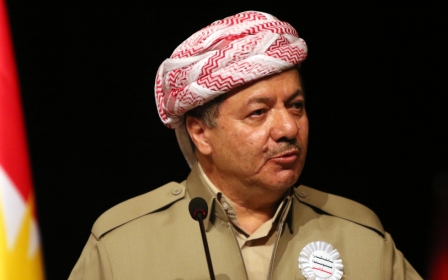ANALYSIS: A battle for power in Kurdish Iraq

The Kurdish region of Iraq, long the example of stability and resilience in the post-Saddam world, is descending into crisis.
On 12 October, the chairman of the Iraqi Kurdish parliament in Erbil was denied access to the city. Yousef Mohammed, of the Change Movement (Gorran), arrived at the southern outskirts of Erbil to find himself blocked by armed forces belonging to the Kurdistan Democratic Party (KDP). They forced him to head back to Sulaimanya, which the KDP considers as a Gorran stronghold. Additionally, ministers belonging to Gorran were denied access to the city and parliament.
This incident comes a few days after anti-government demonstrations in cities throughout the governorates of Sulaimania, Kirkuk and Halabja. Five people died and several more were injured in violent clashes between protesters and riot police. KDP offices were plundered and burned by protesters, and their staff had to abandon the buildings. The KDP blames Gorran for the attacks on their buildings.
“I was covering a peaceful demonstration in Sulaimani on Sunday, when an Asayish officer came up to me and told us to stop filming," said Baban Anwar, a reporter for NRT, an independent Kurdish news agency.
"We were standing before the Sulaimani Directorate of Education covering the teacher’s protests. He didn’t give us time to react. He punched me and broke our team’s camera. He pulled it out of our cameraman's hands and threw it to the ground, shattering it.”
This was not the first time soldiers had attacked journalists and reporters trying to cover protests in the region.
“Sunday’s incident was the fifth attack on NRT journalists since the protests started,” the agency reported. “On 10 October a team covering protests in Sulaimani city was attacked by security forces who seized three of our journalists’ cameras. In addition to that our offices in Erbil and Duhok were stormed by security forces who arrested our staff and deported them to Sulaimani.”
Reporter Wrya Karim was also attacked while live on air from protests that turned violent in the town of Said Sadiq, east of Sulaimani, on 11 October.
The reason for the public outrage in the region lies in several factors. First of all, due to declining oil prices, an ongoing fight with the Islamic State group and a political dispute with Baghdad, the Kurdish government has been unable to pay its large number of employees for more than a year now. Given that most of the Kurdish population in the region works for the government and prices of food and petrol have soared in recent months, tensions have run high among them.
Second, the Kurdish president’s term expired on 20 August. Massoud Barzani, the head of the KDP, still considers himself president although the constitution states that he can serve only two terms. Barzani's time in office has already been extended by two years.
So far the political parties have tried to reach an agreement, but months of negotiations have not secured an agreement and Barzani shows no sign of stepping down.
Before the presidential issue, public outrage increased amid rising allegations of corruption among the oil and finance minsters of the KDP, the intimidation and abduction of activists and journalists, and the banning of parliamentarians from the Patriotic Union of Kurdistan (PUK) and Gorran from entering Erbil. All these factors add up to the chain of events currently happening inside the region.
There are three possible outcomes for the political crisis in the Kurdish region of Iraq.
First, the parties, under internal and international pressure, will compromise and give up some of their demands to find a possible solution for the presidency and other internal issues.
Second, the parties may disregard internal and international pressure and return to two administative regions, as seen before the fall of Saddam Hussein in 2003.
Third, the government could be lifted and the KDP could attempt to establish a new government along with the other parties but without Gorran. One thing to be considered is whether the Patriotic Union of Kurdistan (PUK) will agree to participate in a government established without Gorran. This last outcome is very unlikely since the PUK and Gorran worked very closely together with other parties to resolve this political issue and to keep Barzani from extending his term as president of the Kurdistan region.
So far the opposition parties have said that if they cannot convince the KDP to make any compromises, their only option is to declare the two governorates of Sulaimania and Halabja as semi-independent, as before 2003.
Stay informed with MEE's newsletters
Sign up to get the latest alerts, insights and analysis, starting with Turkey Unpacked
Middle East Eye delivers independent and unrivalled coverage and analysis of the Middle East, North Africa and beyond. To learn more about republishing this content and the associated fees, please fill out this form. More about MEE can be found here.




